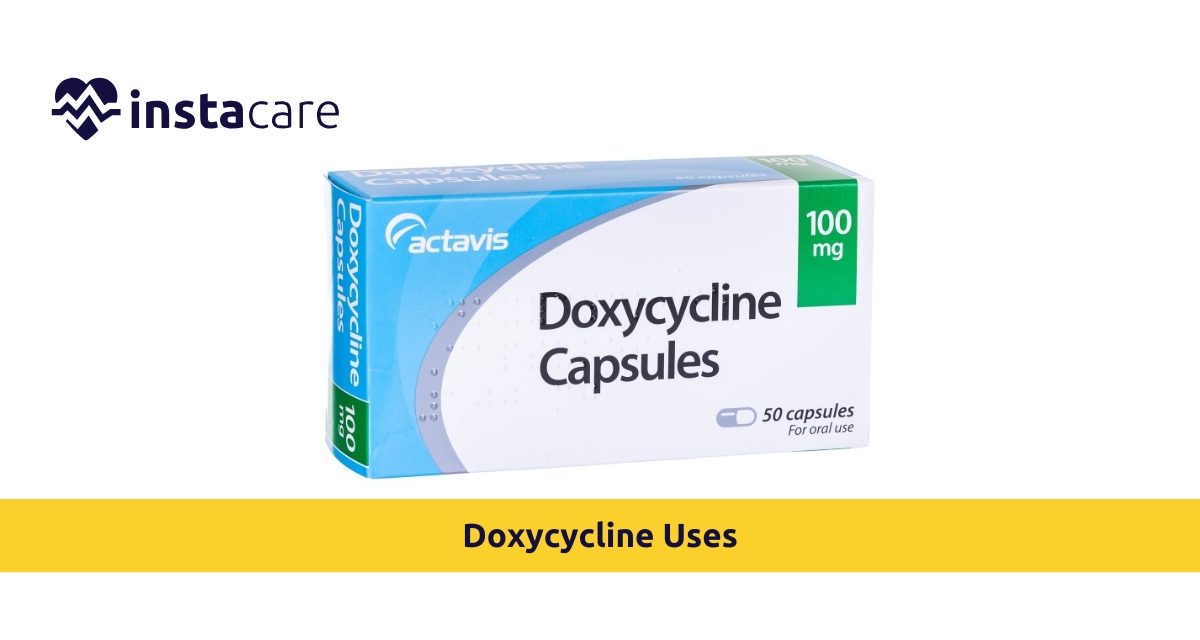Doxycycline belongs to the tetracycline series of antibiotics that are used to treat multiple infections all over the body. As for the fact to what this particular drug turns out to be, that is an antibiotic capable of disposing of the pathogens in the body of a human being it would be possible to cure nearly all kinds of an infection that may take place due to presence of bacteria.
What is Doxycycline?
Doxycycline is an era tablet of the tetracycline category,
which targets the bacteria, which cause the infection and the insertion of the
bacteria for formation of proteins. After that it becomes the duty of the body’s
immune system to clear the infection. Doxycycline is marketed as ordinary round
tablets and capsule, and also as injectable solution preparation.
Some of the popular brands of doxycycline are
- Vibramycin
- Doryx
- Adoxa
Uses of Doxycycline
Some of the diseases that doxycycline is prescribed for,
are;
1. Bacterial Infections
Some of the bacterial infections to be prescribed treatment
using doxycycline, and among which is listed the following.
- Pneumonia and bronchitis and their classification as
respiratory tract infections
- Urinary Tract Infections: this is the cases involving UTIs
from prone bacteria.
- Skin Infections: for example, there is acne and cellulite among others.
2. Sexually Transmitted Diseases
Sexually transmitted diseases with their most common
prescription using Doxycycline, among others;
- Chlamydia. These are infections caused by one bacterium
called Chlamydia trachomatis
- Gonorrhea: As secondary medication in case other drugs to administer are not available.
3. Lyme Disease
Doxycycline is used when Na doxycycline is prescribed as the
first choice treatment for Lyme disease. Lyme diseases are diseases produced by a bacterium transmitted through ticks- Borrelia burgdorferi. During the first
days of treatment by doxycycline, further deterioration of the disease is
prevented
4. Malaria Prophylaxis
A prophylactic dose of doxycycline is administered to the
traveler before travel to endemic malarial regions. It may be given on demand
to be taken on journey and upon return from such locations.
5. Acne
Doxycycline is employed in acute acne of at least moderate
severity because it reduces the severity and number of an attack of acne
through its anti-inflammatory action.
6. Periodontal Disease
It is an inflammatory disease that brings the destruction of
tissues at the area of the teeth and, at the same time, causes harm. It is an
antibiotic that reduces the inflammation as well as load of the bacteria in the
gums.
Dosage of Doxycycline
The Doxycycline dosage will be determined based on
diagnosis, patient's age, and weight of the patient. The prescribing should be
done by a healthcare professional.
General Adult Dosage
- Majority of the infections are treated with an oral dose of
100 mg twice a day, during the first day followed by 100 mg orally daily
thereafter.
- The treatment of Acne is started with an oral dose of 100 mg/day and then it has to be 50 mg orally daily.
Children
Doxycycline is not prescribed for the children less than 8
years because of staining of the teeth. However, it is prescribed for children
greater than 45 kg, and the aim is eradiation of particular infections.
View More: Essential Details to Know About Zestril 20mg - Overview Benefits Risks
Preparation and Administration
- Route: Doxycycline is administered through an oral route.
The drugs come as a tablet or a capsule.
- It is safe to take this drug, so long as it is taken orally,
with or without food and therefore reducing instances of stomach upset. If it
has to be administered with Doxycycline it is a drug that has to be taken down
with a glassful of water and which cannot in any way irritate the esophagus.
- Treatment Duration: This varies with the causative agent of the disease. However, infection always deserves to be treated for its full cycle of antibiotics regardless of how the patient has improved as the return of resistance should not be expected of the resistant bacteria.
Side Effects of Doxycycline
Although non-toxic generally, some of the patients will
experience the effects which are outlined below
1. Gastrointestinal Diseases
- Nausea and Vomiting: There could be an intestinal infection
with nausea and vomiting
- Diarrhea: This antibiotic changes the gut flora hence leads to diarrhea
2. Dermatological Manifestations
- Photosensitivity: This antibiotic also causes photosensitivity
that in some cases leads to sunburn or rashes. The patient should use sunscreen
and also wear protective clothes.
- Allergic reactions: In some allergic responses have been reported. These include features such as rash, and urticaria, pruritus, swelling
3. Central Nervous System Effects
- Dizziness or Light-Headedness: The patients mostly complain
of dizziness. This is because when the patient gets up rapidly from lying down,
then this phenomenon occurs
- Headache: Some patients complain of minor headaches
4. Tooth Discoloration
Doxycycline results in permanent staining of the deciduous
teeth of the patients who are below the age of eight years, and therefore
doxycycline stains the teeth. This is the reason why doxycycline has been
restricted to the use for pediatric patients and in very rare cases.
5. Interactions
Oesophageal Inflammation: If small volume of fluid is
consumed with the doxycycline it may irritate the oesophagus and thus leads to
some kind of swelling in orifices while swallowing.
This is precaution and alert while using the drug
doxycycline.
Caution and Warnings:
1. Pregnancy and Breastfeeding
Doxycycline is a drug placed in Category D where there is
evidence of fetal risk. It should thus be avoided unless absolutely necessary
to use on pregnant patients, and it also gets absorbed into breast milk. The
use of this drug will thus require a doctor's advice if its use is necessary on
a nursing mother.
2. Allergies
The allergic patients should be kept off from being given tetracycline antibiotics with doxycycline. It is always a plus if one
provides an allergy history to their prescriber before starting on your
medication.
3. Hepatic and Renal Impairment
Do not use a patient who has renal or hepatic impairment
while on the doxycycline since he may have to alter the dose. Doctors normally
do this while on treatment using doxycycline.
4. Super infection
The above antibiotics cause long-term effects because of
super infections by the resistant organisms. When the symptoms appear during the
time of treatment, a doctor should be consulted immediately.
Conclusion
Doxycycline is a broad-spectrum antibiotic that is widely
and commonly used in the treatment of a wide range of respiratory and skin type
infections other than those related to sexually transmitted and malaria. It has
very recently been used in the treatment of acne and periodontal diseases due
to the presence of an anti-inflammatory effect. All such drugs are generally
safe unless otherwise advised by the treating physician. Dosage schedules with the frequency of administration and route for giving must always be strict as
advised by the physician.
Please book an appointment with the best Internal Medicine Specialist in Lahore, Karachi, Islamabad, and all major cities of Pakistan through InstaCare, or call our helpline at 03171777509 to find the verified doctor for your disease.











